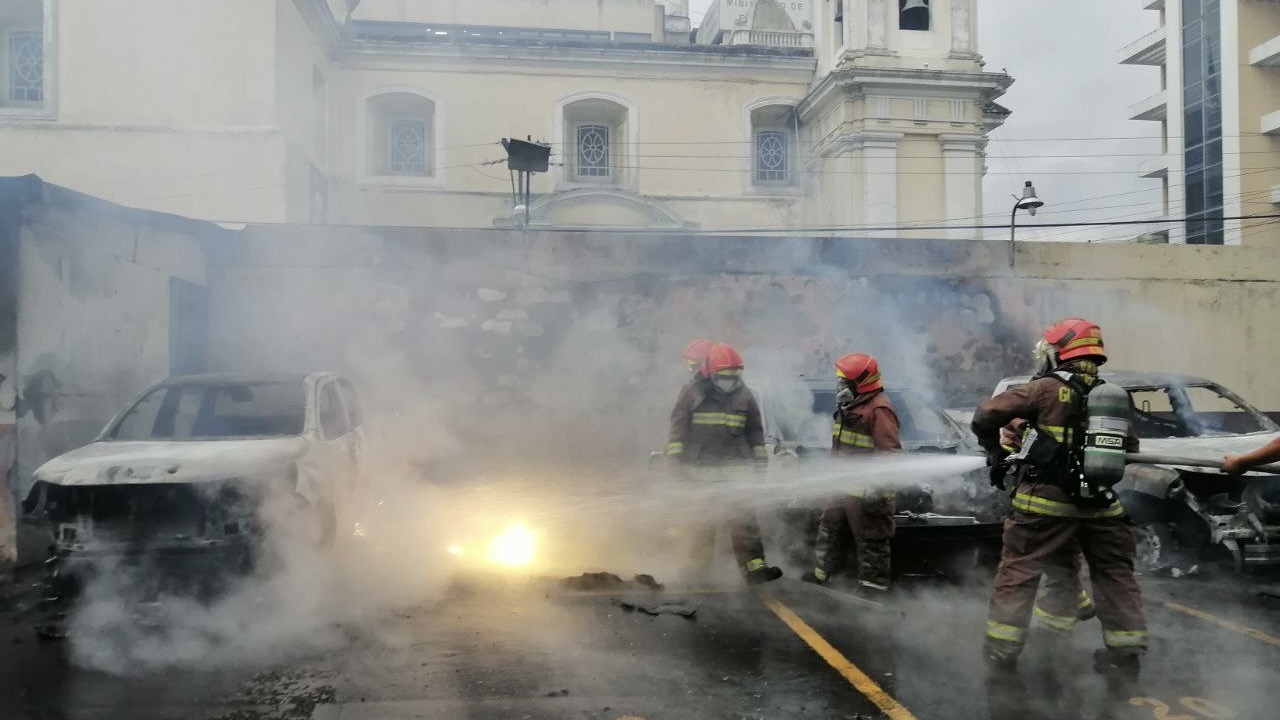On October 19, hundreds of retired military officers demonstrated in the vicinity of the Congress of Guatemala to demand financial compensation for their service during the country’s civil war between 1960 and 1996. The veterans’ protest began in the morning and soon turned into a riot.
A group of protesters, armed with sticks, stones and machetes, broke down one of the building’s gates and forcibly entered the parking lot, where they set fire to several vehicles. The protesters also placed chains with padlocks on several doors of the legislative assembly to prevent the legislators, staff members and media personnel, who were covering a parliamentary session, from leaving the building. There was chaos in the nearby streets, where ex-military personnel burned branches, bags and objects that they found.
Local television reported that more than 200 anti-riot agents of the National Civil Police were deployed, who used tear gas to disperse the protesters and regained control of the parliament facilities and the surrounding streets after hours of struggle. They also safely evacuated everyone from the headquarters.
According to various reports, at least five cars and two motorcycles were torched, and at least 10 security officials and four journalists were injured during the protest. The damage caused to the building’s facilities includes broken gates and glass doors, and others due to the spread of the flames.
The violence and threatening takeover of the parliament was condemned by legislators of all political spectrum. Interior minister Gendri Reyes reported that two people had been arrested and two others had been identified and would be soon arrested.
#URGENTE | Militares retirados toman Congreso de #Guatemala. Exigen indemnización por el trabajo que realizaron durante el conflicto armado interno en los años 80. Congresistas y personal administrativo atrapados en las instalaciones. Habrían amenazado con tomar el aeropuerto. 👇🏾 pic.twitter.com/AYJp7rSBcZ
— Rei Gómez (@ReiGomezR) October 19, 2021
The former soldiers took to the streets over the Congress’ refusal to address a bill that obligates the government to pay a war-time bonus of about 120,000 quetzales (15,500 USD) to each retired soldier or their relatives if they have already died, granted in four annual payments. They are demanding a bonus of about $16,000 for having served in the civil war, in which at least 200,000 people were killed or forcefully disappeared by state security forces.
Last week, on October 13 and 14, hundreds of former members of the armed forces blocked major border points, entrance to a sea port and almost two dozen roads across the national territory. On October 15, they lifted the blockades after reaching an agreement to dialogue with representatives of various commissions to promote the so-called “patriotic bonus” law. The ex-soldiers hit the streets in the absence of advances on the discussion of the said bill, which they demanded to begin yesterday.
Economic compensation to veterans who served in the internal war was one of the campaign promises of far-right President Alejandro Giammattei in the 2019 general elections, and won him the support of key sectors. However, with the compensation threatened, these sectors have turned against him.
Estás son las razones de las manifestaciones, otra de tantas promesas sin cumplir, esperamos que después de estos hechos de violencia existan capturas de los responsables de los daños al @CongresoGuate y sobre todo por el peligro que muchos trabajadores tuvieron que vivir pic.twitter.com/JjtYh677Un
— Samantha Figueroa Diputada (@samanthfigueroa) October 19, 2021
Meanwhile, the same day, hundreds of health workers also demonstrated peacefully in the capital Guatemala City, in rejection of the emergency law for COVID-19 promoted by the national government. The National Union of Health Workers of Guatemala (SNTSG) denounced that the bill would increase precariousness in the sector as it authorizes the government to hire medical personnel without providing job security or labor benefits.
Earlier this year, during the months of July and August, thousands of Guatemalans took to the streets against the mismanagement of the pandemic by the national government and the widespread corruption in the acquisition of COVID-19 vaccines and medical supplies.





